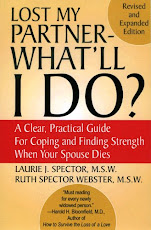
Wish people would stop nagging you to eat when you just don't feel hungry?
If your spouse/partner has recently died, you probably haven't felt much like eating. It's not uncommon to feel a loss of appetite in the first month or so after a death, when your body as well as your mind is in a state of shock. Keep in mind that your appetite should slowly begin to return with time. In any case, always make sure your doctor knows about your recent loss and any prolonged problems you have with your appetite.
We came across the following article (excerpted here) and a slideshow on WebMD. Though not specifically about bereavement, they offer helpful information about coping with appetite loss due to depression and general stress:
Dietary changes can bring about changes in your brain structure, both chemically and physiologically. Those changes can improve mood and mental outlook. Here are 10 tips for eating if you or a loved one is recovering from clinical depression.
1. Eat a diet high in nutrients
2. Fill your plate with essential antioxidants
Studies show that the brain is particularly at risk for free radical damage. Although there’s no way to stop free radicals completely, we can reduce their destructive effect on the body by eating foods high in powerful antioxidants, including:
Sources of beta-carotene: apricots, broccoli, cantaloupe, carrots, collards, peaches, pumpkin, spinach, sweet potato.
Sources of vitamin C: blueberries, broccoli, grapefruit, kiwi, oranges, peppers, potatoes, strawberries, tomato.
Sources of vitamin E: margarine, nuts and seeds, vegetable oils, wheat germ.
3. Eat “smart” carbs for a calming effect
So don’t shun carbs – just make smart choices. Limit sugary foods and opt for smart carbs, such as whole grains, fruits, vegetables, and legumes, which all contribute healthy carbs as well as fiber.
4. Eat protein-rich foods to boost alertness
Good sources of protein foods that boost alertness: beans and peas, lean beef, low-fat cheese, fish, milk, poultry, soy products, yogurt.
5. Eat a Mediterranean-type diet
A recent Spanish study, using data from 4,211 men and 5,459 women, found that rates of depression tended to increase in men -- especially smokers -- as folate intake decreased. The same increase occurred for women -- especially those who smoked or were physically active -- but with a decreased intake of another B-vitamin: B12. This wasn't the first study to discover an association between these two vitamins and depression. Researchers wonder whether poor nutrient intake leads to depression or whether depression leads people to eat a poor diet.
Folate is found in Mediterranean diet staples like legumes, nuts, many fruits, and particularly dark green vegetables. B12 can be found in all lean and low-fat animal products, such as fish and low-fat dairy products.
6. Get plenty of vitamin D
Vitamin D increases levels of serotonin in the brain. Researchers, though, are unsure how much vitamin D is ideal. There are individual differences based on where you live, the time of year, your skin type, and your level of sun exposure. Researchers from the University of Toronto noticed that people who were suffering from depression, particularly those with seasonal affective disorder, tended to improve as their levels of vitamin D in the body increased over the normal course of a year. The recommendation is to try to get about 600 international units (IU) of vitamin D a day from food if possible.
7. Select selenium-rich foods
It is possible to take in too much selenium so that it becomes toxic. But this is unlikely if you're getting it from foods rather than supplements, and it can't hurt to make sure you're eating foods that help you meet the recommended intake for selenium, which is 55 micrograms a day. The good news is that foods rich in selenium are foods we should be eating anyway. They include:
Beans and legumes
Lean meat (lean pork and beef, skinless chicken and turkey)
Low-fat dairy products
Nuts and seeds (particularly brazil nuts)
Seafood (oysters, clams, sardines, crab, saltwater fish, and freshwater fish)
Whole grains (whole-grain pasta, brown rice, oatmeal, etc.)
8. Include omega-3 fatty acids in your diet
We know that omega-3 fatty acids have innumerable health benefits. Recently, scientists have revealed that a deficit of omega-3 fatty acids is associated with depression. In one study, researchers determined that societies that eat a small amount of omega-3 fatty acids have a higher prevalence of major depressive disorder than societies that get ample omega-3 fatty acids. Other epidemiological studies show that people who infrequently eat fish, which is a rich source of omega-3 fatty acids, are more likely to suffer from depression.
Sources of omega-3 fatty acids: fatty fish (anchovy, mackerel, salmon, sardines, shad, and tuna), flaxseed, and nuts. Sources alpha-linolenic acid (another type of omega-3 fatty acid): flaxseed, canola oil, soybean oil, walnuts, and dark green leafy vegetables.

No comments:
Post a Comment